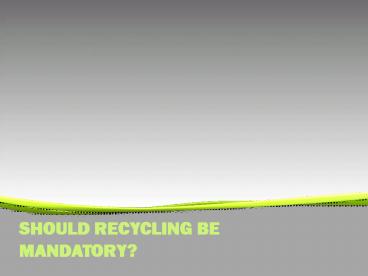SHOULD RECYCLING BE MANDATORY?
Title:
SHOULD RECYCLING BE MANDATORY?
Description:
"Along with the increase in E-waste, clamor for more organized E-waste recycling has been growing loud and thick in recent times. Several global environmental agencies and green organizations have been spearheading green campaigns that aim at making E-waste recycling mandatory for electronic gadget manufacturers. But some manufacturers still ask the question, should recycling be mandatory for all electronic gadget manufacturers? There are some companies that have already started including E-waste recycling in to their electronic gadget manufacturing process life cycle. This is from an article that appeared on All Green Website: " –
Number of Views:452
Title: SHOULD RECYCLING BE MANDATORY?
1
SHOULD RECYCLING BE MANDATORY?
2
- According to Electronic Recyclers International
(ERI), nearly 30 million to 40 million metric
tons of Electronic waste, also known as E-waste,
are generated every year in one form or the
other. Experts attribute this mainly to the
shrinking lifespan of the electronic devices that
are used commercially these days in the form of
smart phones, tablets and notebooks. - Along with the increase in E-waste, clamor for
more organized E-waste recycling has been growing
loud and thick in recent times. Several global
environmental agencies and green organizations
have been spearheading green campaigns that aim
at making E-waste recycling mandatory for
electronic gadget manufacturers. But some
manufacturers still ask the question, should
recycling be mandatory for all electronic gadget
manufacturers? There are some companies that have
already started including E-waste recycling in to
their electronic gadget manufacturing process
life cycle.
3
Electronics Waste Recycling in a Safe and Secure
Manner
As electronic recycling involves re-using
different electronic components that went in to
the making of electronic gadget, electronic
recyclers have the additional responsibility of
preserving personal data that is stored in such
electronic components. Strict control mechanisms
are already in place to guide recyclers when it
comes to preserving customer data.
4
Data Destruction Standards
- Personal data destruction is carried out in
accordance with the National Institute of
Standards and Technology (NIST) media destruction
guidelines. The recycling service provider
determines whether the device has to be
refurbished or shredded. If the recycling service
provider determines that the device can be taken
up for refurbishment, then appropriate software
is used to delete the personal records stored in
the device in accordance with the NIST standards
that talks about the guidelines for media
sanitization. - If the recycling service provider decides to
shred the electronic item, before shredding,
toxic items that are part of the electronic item
such as bulbs, mercury and battery are first
removed. There are shredding machines that have
the capacity to shred 30,000 pounds of e-waste
per hour.
5
Globally Accepted Electronic Recycling Standards
- Electronic recycling service providers have
accepted e-stewards as the global standard to be
followed while providing electronic recycling
services. e-Stewards standards has separately
established guidelines and procedures for
electronic component manufacturers, recycling
service providers and consumers.
6
E-Stewards Guidelines for Recycling Service
Providers
- In order for the electronic recycling service
provider to be e-Stewards certified, the service
provider should first set up processes that
adhere to the ISO 14001 Environment Management
standards. The different controls specified in
ISO 14001 include the health safety controls,
data security controls and social accountability
controls. Once the electronic recycling service
provider establishes their processes to be in
accordance with ISO 14001, the next stage would
be audits conducted by the e-Stewards certifying
bodies. - For recycling to be mandatory, more electronics
recycling companies will need to be up to speed
with the guidelines set out for the correct
disposal of e-waste. Only then can the full
benefit of universal electronics recycling be
felt.
7
Questions? More Information?
- Website http//www.allgreenrecycling.com
- All Green Recycling
- info_at_allgreenrecycling.com
- (800) 780-0347
- Source
- http//electronicrecyclers.com/e-waste-solutions
- http//e-stewards.org/learn-more/for-recyclers
- http//csrc.nist.gov/publications/nistpubs/800-88/
NISTSP800-88_with-errata.pdf - http//e-stewards.org/learn-more/for-recyclers/ove
rview/benefits-of-certification/ - http//www.allgreenrecycling.com/blog/should-recyc
ling-be-mandatory/































